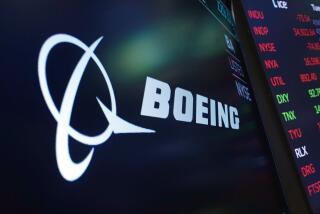Airline Stocks Get a Lift on Rising Hopes
- Share via
Airline stocks rose for the fifth straight session Monday--pushing one index up 37% in the last week--as investors focused on lower jet fuel prices and other factors that could lift the carriers in the months to come.
In an odd twist, the rebound began the day after the crash of an American Airlines jet Nov. 12 in New York. The fact that the tragedy apparently was not tied to further airline terrorism is another reason the stocks have moved higher, analysts said.
The American Stock Exchange’s index of airline shares rose 8.36 points, or 10%, to 89.55 points Monday and has soared 37% since the crash, far outpacing the 3% gain by the broader market as measured by the Standard & Poor’s 500 index. And it’s happening near the end of a year in which the airlines are expected to collectively lose $7 billion or more, their worst annual performance on record.
Sustaining the rally are a plunge in jet fuel prices, passage of a new air security law signed Monday by President Bush, the absence of more terrorism since Sept. 11, U.S. advances in Afghanistan and rising hopes that the economy will rebound next year and prompt more travel--especially business travel, analysts said.
“So you have some marginal restoration of traveler confidence, an expectation of a more robust U.S. economy, an abatement of some of the [airlines’] cost issues, and the war is turning more favorable for the U.S.,” said John Linehan, airline analyst at mutual fund company T. Rowe Price Group Inc. “Those four events are propelling the stock prices.”
But he and others caution that airline stocks still carry enormous risks, and that many investors might simply be doing some temporary bargain-hunting because the stocks had been decimated before last week.
“I don’t see any of the big network carriers making any money for probably the next three quarters, so the market may be getting a little ahead of itself,” said Ray Neidl, an analyst at ABN Amro in New York.
Even before Sept. 11, the carriers were suffering from a weakening economy and a sharp falloff in business travel, which accounts for the bulk of the airlines’ revenues because business passengers typically pay higher fares.
The terrorist attacks, followed by a two-day shutdown of civilian air travel and a plunge in passenger traffic, pushed the airlines to the brink. Most of the airlines slashed their operations by 15% or more, eliminated a combined 100,000 jobs and won a $15-billion federal bailout to stay airborne.
Their condition has since stabilized despite the crash involving American, a unit of AMR Corp., thanks in good part to initial payments made to the airlines from the $5-billion cash portion of the bailout package. The rest of the rescue bill involves $10 billion of federal loan guarantees.
Yet the industry’s prognosis remains bleak. There are still about 1.5 million fewer people boarding domestic flights each week compared with a year ago. Business travel remains depressed. One airline, America West, has applied for one of the U.S.-backed loans and others might follow. Several carriers have delayed taking delivery of new aircraft.
For example, United Airlines said Friday it’s going to accept delivery of only 24 aircraft next year and in 2003 instead of the 67 originally planned over that period. But the move also will save the carrier $2.5 billion, which helped the stock of its parent, UAL Corp., jump $2.48 a share, to $16.72, Monday on the New York Stock Exchange.
The drop in fuel prices appears to be the key attraction for investors. Jet fuel now costs 55 to 60 cents a gallon, “and this time last year it was 85 cents a gallon,” said John Armbrust, publisher of Armbrust Aviation Group, a firm that tracks the fuel market.
Fuel typically accounts for 13% to 17% of an airline’s overall operating expenses, and it’s the second-biggest cost for a carrier behind labor. Now, fuel prices are tumbling because of slumping crude-oil prices and the airline industry’s own retrenchment.
Questions remain, however, about how the carriers and organized labor will negotiate the industry’s tough times and whether the airlines will demand any concessions from their employees.
On Monday, the union representing 15,000 United Airlines mechanics rejected an offer of binding arbitration for its current contract negotiations, raising the threat of a strike after a 30-day “cooling off” period that would start this week.
But President Bush has vowed to block any strike that might hit a major airline, and United said customers “should book with confidence” because of the White House position.
Southwest Airlines continues to be among analysts’ favorite picks. The airline was one of only two carriers that were profitable this year before Sept. 11; it has $2 billion of cash and one of the lowest cost structures in the business. Southwest rose 42 cents, to $18.74 a share on the NYSE.
Continental Airlines is a favorite of analyst Brian Harris of Salomon Smith Barney, because the Houston-based carrier also was profitable before the attacks, and has one of the stronger hub-and-spoke systems relative to its size. Continental gained $1.19 a share, to $21.55 on the NYSE.
Also on the NYSE, America West rose 71 cents, or 34%, to $2.79 a share Monday; industry leader AMR was up 71 cents at $20.77; Delta rose 85 cents to $28.82 and US Airways jumped $1.63, or 23%, to $8.60 a share. Northwest gained $1.28 to $16.93 on Nasdaq.
*
Bloomberg News was used in compiling this report.
(BEGIN TEXT OF INFOBOX / INFOGRAPHIC)
Airline Stocks Are Taking Off
(text of infobox is not included)
More to Read
Inside the business of entertainment
The Wide Shot brings you news, analysis and insights on everything from streaming wars to production — and what it all means for the future.
You may occasionally receive promotional content from the Los Angeles Times.











